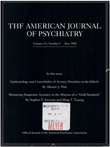Tardive dyskinesia in elderly psychiatric patients: a 5-year study
Abstract
OBJECTIVE: The authors investigated the prevalence of tardive dyskinesia among elderly psychiatric patients who had never received neuroleptic medication before their first hospitalization. METHOD: The study was performed in the geriatric psychiatry unit of a university- affiliated hospital in Canada and involved all first-admission patients admitted from September 1984 through August 1989 who had never taken neuroleptic drugs. In September and October 1989, the patients who were available for follow-up were examined and given ratings on the Abnormal Involuntary Movement Scale to establish the presence or absence of tardive dyskinesia. The patients' records were reviewed for information on age, diagnosis, duration of hospitalization, neuroleptic treatment received after admission, anticholinergic drugs received, and drug-free periods. RESULTS: Of the 162 patients who were available and whose data were analyzed, a total of 99 had been treated with neuroleptics, and 35 (35.4%) of these were found to have tardive dyskinesia. Two of the 35 also had tardive dystonia. Significantly more patients with major depression than patients with primary degenerative dementia or delusional psychosis had tardive dyskinesia. CONCLUSIONS: This study confirms the higher vulnerability of elderly psychiatric patients treated with neuroleptics to the development of tardive dyskinesia. The authors stress that caution is especially necessary when neuroleptics are prescribed for older patients with major affective disorders.
Access content
To read the fulltext, please use one of the options below to sign in or purchase access.- Personal login
- Institutional Login
- Sign in via OpenAthens
- Register for access
-
Please login/register if you wish to pair your device and check access availability.
Not a subscriber?
PsychiatryOnline subscription options offer access to the DSM-5 library, books, journals, CME, and patient resources. This all-in-one virtual library provides psychiatrists and mental health professionals with key resources for diagnosis, treatment, research, and professional development.
Need more help? PsychiatryOnline Customer Service may be reached by emailing [email protected] or by calling 800-368-5777 (in the U.S.) or 703-907-7322 (outside the U.S.).



